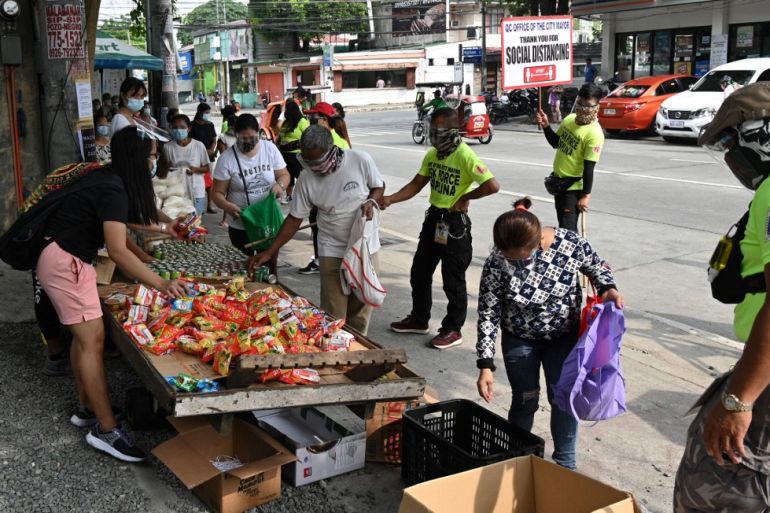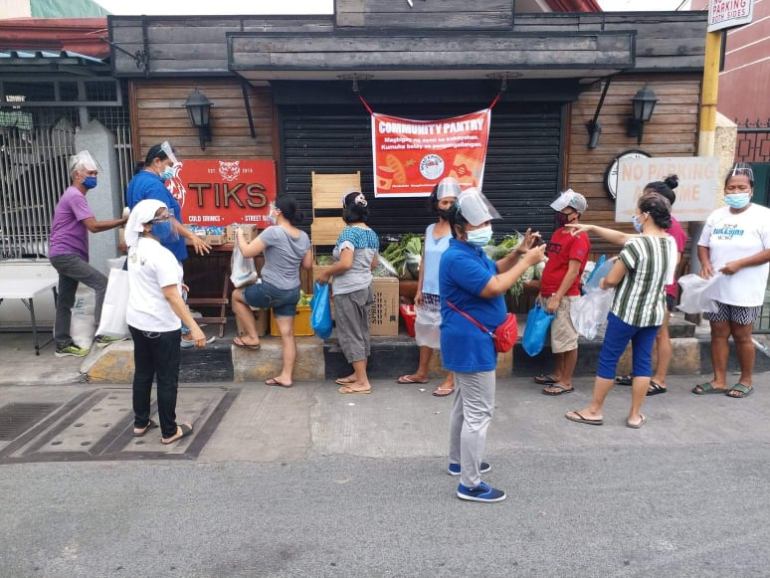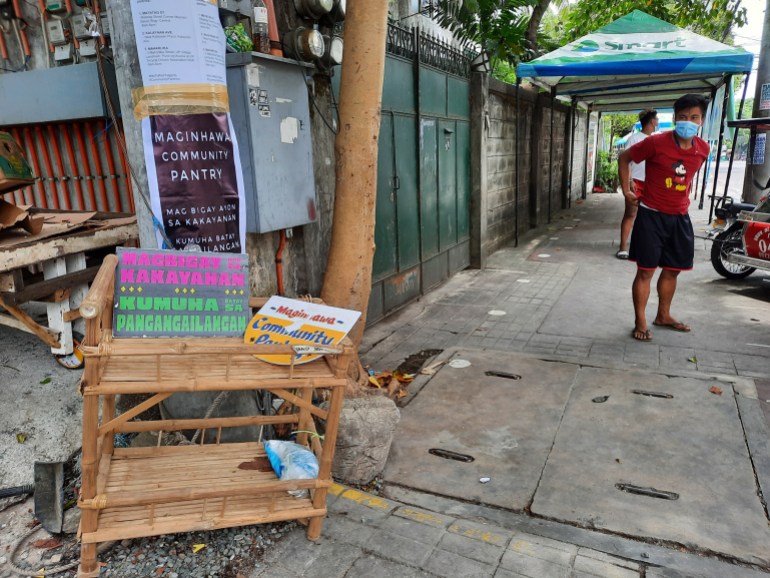Food pantries for hungry Filipinos get tagged as communist
People turn against the Duterte administration after a military-led agency accuses volunteers of a popular feeding initiative of being communist sympathisers.

Manila, Philippines – In the past week, little charitable grocery booths have sprouted on street corners and alleys all over the Philippines, offering free food to needy people and soliciting donations from anyone willing to give them, as many families in the country go hungry during the extended COVID-19 lockdown.
“Give what you can afford, take what you need,” read the signs on each booth, which organisers call “community pantry”.
Keep reading
list of 3 itemsPhilippines announces strict COVID lockdown in and around Manila
Argument over porridge reveals Philippines’ COVID fiasco
The movement, helped along by social media, has gone viral in the archipelago, whose economy now languishes because of the pandemic.
The economy contracted by an unprecedented 9.5 percent in 2020 due to intermittent lockdowns, causing many businesses to close.
In February, some 4.2 million Filipinos were unemployed, according to government data, which also predicted that up to 17.5 percent of the country’s 110 million people will remain poor this year.
When Winnie Rayos Dimanlig, a local government employee in Manila, read a Facebook post about the first community pantry in a nearby district, she also decided to start one right away.
“The beauty of the community pantry is in its simplicity. You have a cart there, you fill it with food that anybody needing to tide over their hunger can just take from, and anyone who has in excess can add to,” Dimanlig told Al Jazeera.
She told her friends about the idea and donations came in. On Monday, Dimanlig opened her community pantry in front of her house, with rice, vegetables, fruit, meat, tinned goods and other basic food items stacked on small tables and shelves on the sidewalk.
Hundreds queued up
Hundreds of poor people queued up for a turn to pick from the items on offer. On Saturday, Dimanlig counted at least 700 people who came to her community pantry.
At first, her friends worried about their stocks running out, but they were stunned by how fast donations kept pouring in, many from strangers.
“We’ve had people drive by just to drop off their contributions. There are more donations now from people I don’t even know,” Dimanlig said.
Dimanlig’s community pantry is one of at least 350 similar efforts started by common people in different parts of the Philippines. There is even one in East Timor, supported by the local Filipino community.
The line at 10am for the Maginhawa Community Pantry. It’s a 4-5 hour wait, but people endure because they’ve lost income and need the food aid. No one is taking more than what they need for the day. The Philippines is in the middle of its worst COVID-19 surge and recession. pic.twitter.com/lYXEfoFLoW
— Barnaby Lo 吳宗鴻 (@barnabychuck) April 23, 2021
‘Tired of inaction’
It all began on April 14, when Ana Patricia Non, a young furniture designer and businesswoman, left a wooden cart stacked with food on a street corner in a university village in Manila.
Passersby initially hesitated to take stuff from the cart – it seemed too good to be true, and the needy tend to be ashamed of their poverty. Non had to assure them there was no catch, and they really did not have to pay for what they would take.
“I am tired of complaining. I am tired of inaction,” Non told the Manila-based news website Rappler when her community pantry started drawing public attention.
“This community pantry became a way to prove to ourselves that we can help one another, and we are able to organise ourselves,” she added during a media conference.
The Philippine government has been widely criticised by experts and citizens for its tepid response to the pandemic. President Rodrigo Duterte recently called the crisis “a small thing”, even as COVID infections reached record numbers.
On Friday, the health department reported 8,719 new infections and a total caseload of almost 980,000. The country’s COVID death toll crossed 16,500.
To stave off the new wave of infections, Manila and its surrounding provinces have been put on lockdown yet again. Daily wage earners who do odd jobs are unable to make a living, but the government has capped financial aid for them at $20 per individual, saying social welfare funds have run out.

Many Filipinos saw the community pantries as an inadvertent indictment of the government’s “inaction”.
“There is so much darkness not just because of the pandemic but how this pandemic is being addressed and all the problems attendant to it. It’s just – we need to do something,” said Dimanlig.
Dindo Manhit, president of Stratbase ADR Institute think-tank, told Al Jazeera that people are no longer waiting for the government’s action but have taken the initiative to do their own part.
Communist propaganda?
But what Non said about “complaining” and “inaction” on the pandemic may have offended the government.
“That can be seen as a political statement,” Manhit said.
Days after Non’s initiative attracted popular attention, the government’s military-led anti-communist task force started “checking the background” of organisers.
Lieutenant General Antonio Parlade Jr, the spokesman of the agency, said some community pantries were distributing leaflets containing anti-government propaganda.
“They distribute food, and with it is the poison of hate and mistrust towards a government that is ceaseless and faithful in its service to the Filipino people. This is simply not right and in defense of our people and State, must be corrected,” Parlade said in a statement on Tuesday.
Al Jazeera sought further comment from Parlade, but he did not immediately respond to the query.
Although the general has yet to show evidence of his claims, government social media platforms have carried his statements. The local police unit that covers Non’s community pantry later posted a warning on its social media pages claiming that the organisers had links to the outlawed Communist Party of the Philippines. The post has since been deleted.
The government’s response to the citizen-based action quickly sparked fear among organisers, who feared for their lives. Non was forced to briefly suspend her project fearing for her safety and that of her fellow volunteers.

The Duterte administration has been pushing to stamp out the country’s five-decade-old communist armed uprising, and Parlade’s office has been going after groups and personalities it perceives as communist sympathisers.
With echoes of Duterte’s deadly “war on drugs”, the anti-communist campaign, also referred to as “Red-tagging” has seen dozens of activists and human rights lawyers killed in vigilante-style attacks in the last two years.
Although Duterte presented himself as pro-communist when he campaigned for the presidency in 2016, he has since antagonised the communist party and other leftist groups, following failed attempts at peace negotiations.
Duterte’s government now considers the communist party a “terrorist organisation”, and a new law condemns supporters of such groups as being “terrorists”, too.
“In all honesty, I have no links to the communist party. I am sorry, but that question is so malicious,” Non said when she was asked to comment on Parlade’s allegations.
“I’ve said that I’m disappointed with the [government’s] response. It’s true. I know that the government is working, but, in my opinion, it falls short, because people won’t stand in line that long if they’re getting enough support,” she added.
‘Why put malice?’
Non and several other community pantry organisers reported having been approached and questioned by police, some bearing firearms.
Police officers also came to Dimanlig’s community pantry on Tuesday, asking for details about its organisers. Worried that she was under scrutiny, too, Dimanlig phoned her local police chief, who told her they only wanted to ensure health protocols were being followed, and they were not profiling her.
Outraged by the government’s response, many Filipinos voiced their support for Non and the community pantry movement on social media. They slammed the government for getting in the way of a good thing.
Manhit said he found the accusation of communist links laughable, because community pantries are out in the open, and so far there has been no evidence of illegal activity.
“Why put malice into it? When you are not violating any law of the land, whatever your political ideology is, you are protected by your rights as a Filipino citizen, enshrined in our constitution,” Manhit said.
Zena Bernardo, Non’s mother, said she saw the backlash from the government coming. An activist herself, Bernardo had a run-in with police in May 2020 when she organised a community kitchen. Police arrested her volunteers because their truck bore a placard with a message critical of the government.
Bernardo said the clampdown on community pantries might discourage people from trying to help their communities.
“Don’t bother to help because they might suspect you’re a rebel or terrorist,” Bernardo told Al Jazeera. “Does it mean kindness is an act of terrorism now?”
Senator Joel Villanueva reacted to NTF-Elcac spokesperson Lt. Gen. Antonio Parlade Jr.’s remark in an interview over One News’ The Chiefs last Tuesday, where the military official likened the Maginhawa Community Pantry to Satan’s apple.https://t.co/t0ZKT7MTfl pic.twitter.com/iDCF9166rs
— Inquirer (@inquirerdotnet) April 22, 2021
‘Kindness is everyone’s colour’
The tide has since turned for Non and community pantries after the anti-communist task force’s statements backfired.
A group of senators spoke defending Non, and proposed to defund the anti-communist task force, which received a budget equivalent to $390m this year.
Duterte’s office, which earlier praised community pantries, distanced itself from Parlade’s statements and said it would caution the general against making clumsy statements.
“Kindness is everyone’s colour. Whatever one’s convictions are, if they’re sincerely helping others, we will support them, Defense Secretary Delfin Lorenzana said in a statement.
Non has reopened her community pantry, with more vendors and displaced business owners offering to help. She said it will remain open as long as donations keep coming.
The same goes for Dimanlig’s community pantry.
“It promotes kindness. It promotes the idea that you are supposed to be responsible for your fellow human beings, especially now,” she said.